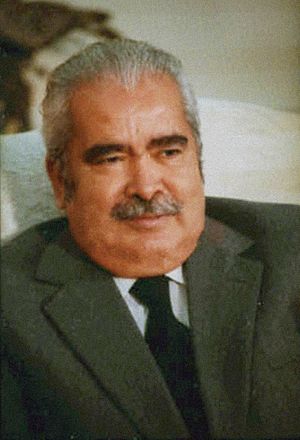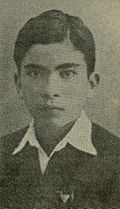Luis Herrera Campins facts for kids
Quick facts for kids
Luis Herrera Campins
|
|
|---|---|
 |
|
| President of the Republic of Venezuela | |
| In office 12 March 1979 – 2 February 1984 |
|
| Preceded by | Carlos Andrés Pérez |
| Succeeded by | Jaime Lusinchi |
| Senator for life | |
| In office 2 February 1984 – 30 December 1999 |
|
| Personal details | |
| Born |
Luis Antonio Herrera Campins
4 May 1925 Acarigua, Portuguesa, Venezuela |
| Died | 9 November 2007 (aged 82) Caracas, Venezuela |
| Political party | Copei |
| Spouse | Betty Urdaneta |
| Signature |  |
Luis Antonio Herrera Campins (born May 4, 1925 – died November 9, 2007) was a Venezuelan politician. He served as the President of Venezuela from 1979 to 1984. He was elected for a five-year term in 1978. Herrera Campins belonged to the COPEI party. This party is known for its Christian Democratic ideas.
Contents
Early Life and Political Start
Luis Antonio Herrera Campins was born in Acarigua, a city in the Portuguesa state of Venezuela. He began studying law at the Central University of Venezuela. However, his studies were stopped when he was put in prison. This happened during the time when Marcos Pérez Jiménez was in charge of the country.
Later, in 1955, he finished his law degree. He earned it from the Universidad de Santiago de Compostela in Spain. Herrera Campins started his political journey in 1937. From 1959 to 1979, he worked in the National Congress. He became President of Venezuela on March 12, 1979.
Presidency (1979-1984)
As president, Herrera Campins focused on several important areas. He worked on cultural development and made changes to education. He also changed how prices were controlled, which affected the value of the Venezuelan bolívar, Venezuela's money.
Economic Policies
Herrera Campins believed the government should play a big role in the economy. He directed public money into projects for farming and industry. His government also gave out many subsidies and controlled the prices of many goods.
During his early years as president, Venezuela's oil income kept growing. His government continued to borrow money from banks around the world. By the early 1980s, Venezuela owed more than $20 billion. The government thought that oil prices would always stay high.
Foreign Policy
President Herrera Campins also had a strong foreign policy. In 1980, he signed an agreement with Mexico. They agreed to provide oil to countries in Central America and the Caribbean together. This was a step towards future oil diplomacy in the region.
In 1982, Herrera Campins supported Argentina in its war with the United Kingdom. This war was over the Falkland Islands. His support for Argentina helped increase his popularity in Venezuela. This was also when Venezuela was pushing its claim to more than half of neighboring Guyana. His government also recognized the Sahrawi Arab Democratic Republic as a country. In December 1982, Venezuela's oil company, PDVSA, started a partnership with a German oil company. This was the beginning of PDVSA's international business.
Later Life
By the end of Herrera Campins's time as president, Venezuela's economy was struggling. Many people faced poverty and hardship. In the 1983 elections, voters chose a different party. After his presidency, Herrera Campins remained important in the Copei party. He became its president in 1995.
In 2001, his car was stolen by gunmen, which made headlines. After this, he was sometimes seen walking and carrying his own groceries. He had several surgeries for a health issue. Luis Herrera Campins passed away on November 9, 2007, in Caracas. He was 82 years old and had retired from politics. He was survived by his wife, Betty Urdaneta, and their three sons.
See also
 In Spanish: Luis Herrera Campíns para niños
In Spanish: Luis Herrera Campíns para niños
 | Lonnie Johnson |
 | Granville Woods |
 | Lewis Howard Latimer |
 | James West |


